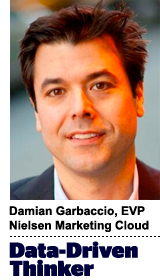 “Data-Driven Thinking” is written by members of the media community and contains fresh ideas on the digital revolution in media.
“Data-Driven Thinking” is written by members of the media community and contains fresh ideas on the digital revolution in media.
Today’s column is written by Damian Garbaccio, executive vice president at Nielsen Marketing Cloud.
We all know that consumer packaged goods (CPG) companies spend a lot on advertising. In the US alone, CPG and consumer products advertisers will spend nearly $6 billion on digital advertising in 2016, according to eMarketer.
Despite this investment and the eventual payoff of driving brand awareness, CPG marketers face an immense challenge today: customer data scarcity. Many CPG brands don’t own or have access to customer purchase data – retailers and channel partners do, but they are hesitant to part with it.
Yet sales data is the golden goose of effective marketing. A brand’s sales data should inform its marketing spend, campaign optimization and in-store merchandising strategies. Employing the right tools, retailers can connect offline purchase data with online behavior to get a more complete understanding of what customers are doing outside the “store” experience.
That’s powerful stuff. It works wonders to answer the critical question: “Are my marketing efforts quantifiable and yielding positive results?” It enables marketing departments to make more informed and inevitably better-performing decisions around campaign strategy from media spend allocation to channel selection, creative versioning to device targeting.
That’s all well and good, but where does that leave the makers of the products the retailer is selling? Shooting in the dark. Compound this retail “point-of-sale” data scarcity issue with the fact that immense stores of first-party consumer data are controlled by a small number of very influential tech companies, and you are talking about a consumer data access problem bigger than those in the CPG space have ever seen.
The good news is that CPG brands can win at this and become “consumer data autonomous.” Consumer data is incredibly valuable and essential for success in today’s omnichannel marketing environment. It’s time for the brands to get direct access to it; it is largely their budgets that are driving brand awareness, purchase and loyalty.
CPG marketers need to start by building their own defensible consumer data strategies. The first and easiest step is to collect and warehouse the customer data they do have, which may come from a CRM system, website, mobile app, digital campaign or surveys. However limited, this data is the cornerstone on which this consumer data castle is built. CPG marketers should link with a third party for data they don’t have.
Once the pipes are connected and the data is flowing, CPG marketers need to embrace data science and machine learning. Machine learning technology can continuously analyze and act on billions of consumer data points and make sense of what is otherwise noise.
Advanced data science methodologies that used to be the stuff of academics and physicists are now becoming available to a wider audience. The algorithms that sit behind all those audience segments are capable of up-to-the-second “learning.” This gives CPG marketers and others the ability to set up marketing programs that respond to the constant changes in consumer behavior in an automated way that gets smarter over time.
The more data the targeting algorithms see, the more accurate they become. Marketers can also more rapidly disseminate audience “data instructions” to their CMS for website personalization, their email service provider for email content customization and all the appropriate ad servers across online display, mobile, video, social and search for broad advertising personalization.
With all of this in place, CPG marketers can be that much closer to the ideal end state: an end-to-end customer data ecosystem. Such a tool set can enable them to quantify the ROI of nearly every media dollar spent across channels and to rapidly adapt to real-world changes in consumer sentiment. It’s a sustainable way to reduce media waste, improve customer experience and increase the impact of their marketing budgets.
The marketing efficiency gains are well worth the effort in the short term. And in the long term, CPG companies taking these steps will have freed themselves of their dependency on others for what is rightfully theirs: the customer.
Follow Nielsen (@Nielsen) and AdExchanger (@adexchanger) on Twitter.










